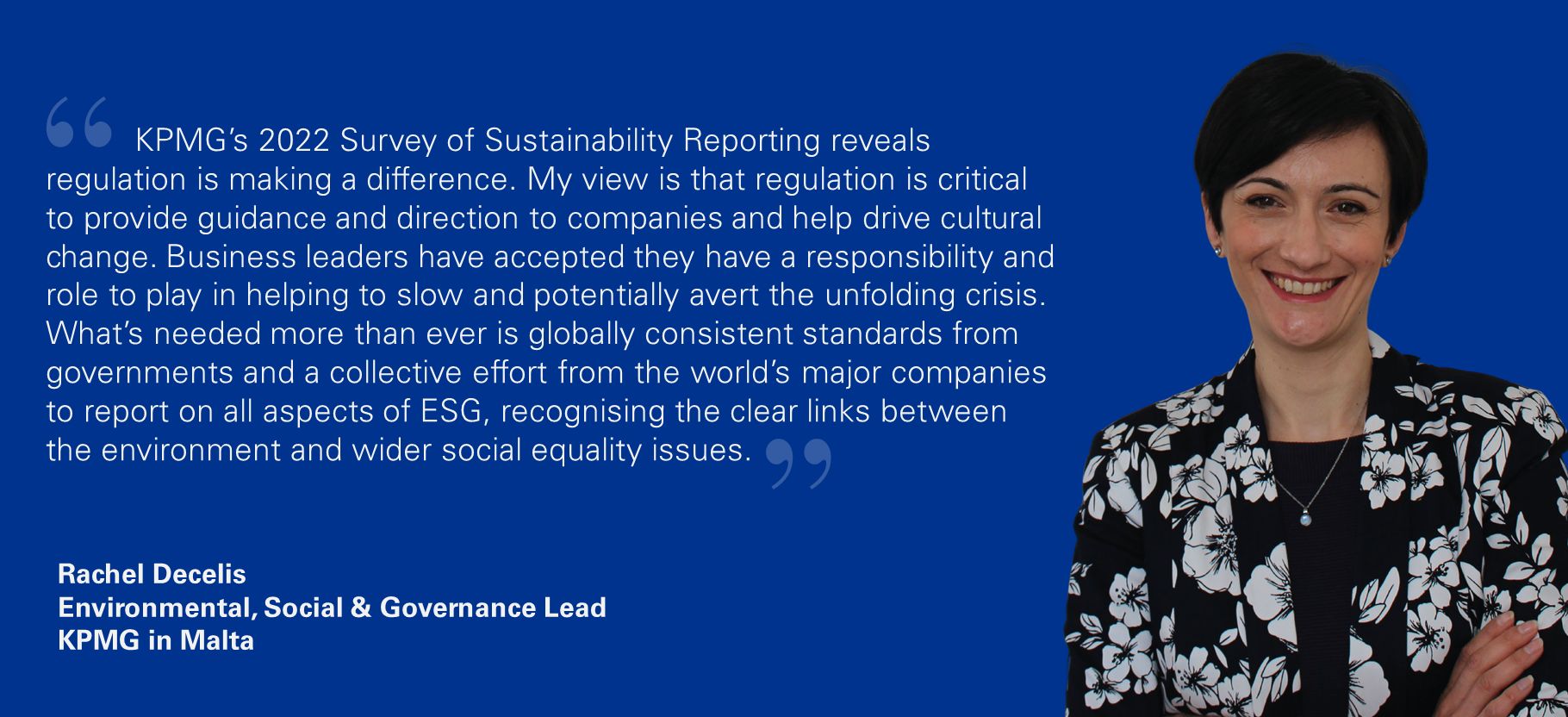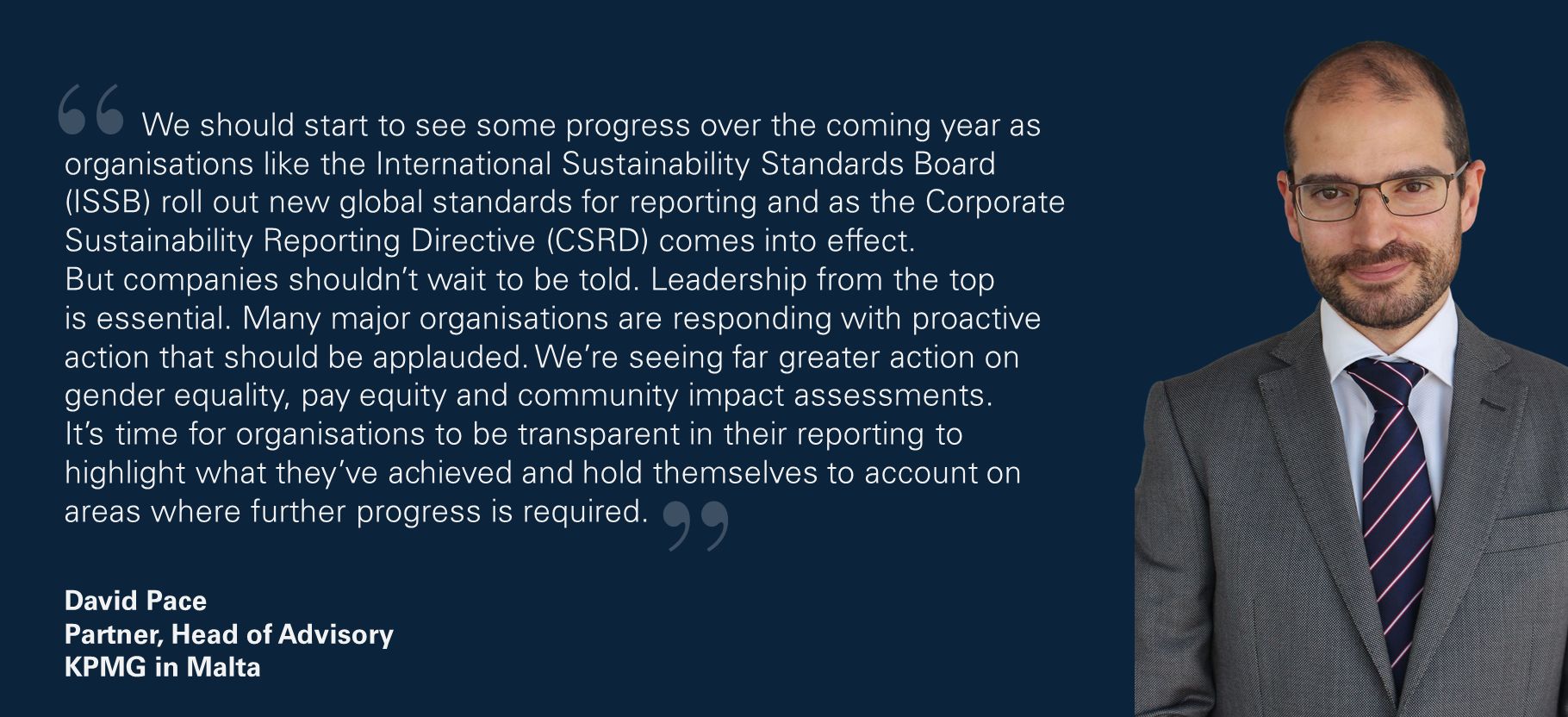The world’s top companies improving on climate reporting, but more progress is needed in key areas of sustainability & ESG
KPMG International launches 12th edition of The KPMG Survey of Sustainability Reporting
KPMG International launches 12th edition of The KPMG Survey of Sustainability Reporting
- The latest findings from KPMG reveal that sustainability reporting has grown steadily, with 79 percent of leading companies providing sustainability reports
- There has been marked improvement in companies reporting carbon reduction targets, but action remains too slow in key related areas, with less than half of companies currently recognizing biodiversity loss as a risk
- Among the thousands of reports analysed, less than half of the world’s largest companies are providing reporting on ‘social’ and ‘governance’ components of ESG
- KPMG outlines a series of recommendations, including companies shifting from a narrative-driven approach and making better use of data to drive change and provide evidence of action
- From recent local data and discussions with our community, Maltese companies appear to be lagging the global trend presented in this survey, although there are promising developments, including reporting by 22 companies under the Malta ESG Platform. Transparent ESG reporting and action will be crucial if Maltese companies are to remain relevant to international business and align with the broader values of Malta’s residents.
First published in 1993, the KPMG Survey of Sustainability Reporting is produced every two years and this year’s edition provides analysis of the sustainability and Environment, Social and Governance (ESG) reports from 5,800 companies across 58 countries and jurisdictions. The findings released today show that there is still a disconnect between the urgency of addressing climate change and social equity, and the ‘hard results’ provided by businesses.
The latest findings reveal that sustainability reporting has grown steadily. The world’s top 250 companies – known as the G250 – are almost all providing some form of sustainability reporting, with 96 percent of this group reporting on sustainability or ESG matters.
Meanwhile, there has been a steady and consistent increase in reporting from the so-called N100 (the top 100 countries in each country or jurisdiction analysed). Ten years ago, around two-thirds of the N100 group of companies provided sustainability reports. The figure now stands at 79 percent.
Climate continues to dominate
The latest findings reveal that businesses are increasingly recognising that they have a role to play in helping to achieve climate targets, with an impressive 71 percent of the N100 and 80 percent of the G250 setting carbon reduction targets. Reassuringly, most companies recognise that they must reduce their own emissions to achieve their carbon targets rather than rely solely on carbon credits. The number of companies reporting against Task Force on Climate-related Financial Disclosures (TCFD) guidance has nearly doubled, leading to better climate disclosure.
However, the report also reveals some key areas where faster progress is required. Only 64 percent of G250 companies formally acknowledge that climate change is a risk to their business, and less than half of companies currently recognise biodiversity loss as a risk.
Sustainability reporting through the ESG lens
This year’s report has also highlighted some further challenges the world’s major companies are facing reporting on ESG. Among the thousands of reports analysed, less than half of the world’s largest companies provided reporting on ‘social’ components (e.g. modern slavery; diversity, inclusion and equity; community engagement; and labour issues), despite an increasing awareness of the link between the climate crisis and social inequality. At the same time, less than half of companies disclosed their governance risks (e.g., corruption, bribery and anti-corruption, anti-competitive behaviour or political contributions.) In addition, only one third of N100 companies have a dedicated member of their leadership team responsible for sustainability and less than one-quarter of these companies link sustainability to compensation among business leadership.
ESG disclosures continue to be overwhelmingly narrative-driven, rather than publishing quantitative or financial data regarding impacts. This is clearly an area of improvement for companies around the world.
On a positive note, around three-quarters of reporting companies conducted materiality assessments and are disclosing material topics.


The regional picture
There has been significant growth in sustainability reporting in three countries since 2020: Iceland (+ 39 percentage points), United Arab Emirates (+22 percentage points) and South Korea (+22 percentage points).
The Asia Pacific region leads in sustainability report, with 89 percent of its companies undertaking sustainability reporting. This is followed by Europe (82 percent), the Americas (74 percent) and the Middle East and Africa (56 percent).
This year’s report highlights regional variations in the contents of sustainability reporting, largely driven by top-of-mind concerns and regulatory differences. While North America (97 percent) and Western Europe (85 percent) stand out with the highest overall reporting rates, the Middle East (55 percent) and Asia Pacific region (30 percent) stand out on integrated reporting. Meanwhile, Latin America (50 percent) stands out on biodiversity reporting and Africa stands out on social and governance reporting (51 percent and 49 percent, respectively).
A call to action
New ESG requirements are driving a different perspective and set of conversations in Boardrooms, driving business leaders to stretch their thinking and ensure that from the top down they are making strategic decisions that take climate and broader ESG considerations more into account.
The KPMG report outlines the tangible ways businesses can invest in sustainability reporting:
- Understanding stakeholder expectations
- Incorporating materiality assessments into reporting
- Aligning reporting to mandatory or voluntary frameworks
- Investing in quality non-financial data management
- Understanding the impact of climate change and social issues on business
The pressure on businesses to report on non-financial metrics is only expected to grow as regulations evolve. By acting now, companies can make informed choices to drive the change that is much needed to be a good corporate citizen in today’s world.
To read the full report, visit: home.kpmg/sustainabilityreporting
About KPMG’s Survey of Sustainability Reporting
First published in 1993 The KPMG Survey of Sustainability Reporting aims to shine a light on how the world’s largest companies are responding to and reporting on their response to the climate crisis and wider social issues. This year’s survey is the 12th edition from KPMG and the most extensive to-date, offering an in-depth ‘report card’ on the state of sustainability reporting in 2022 and examines sustainability reporting trends around the world. Over the past two decades, sustainability reporting has been largely voluntary, so the purpose of this survey was to offer meaningful insights about how to improve levels of disclosure by business leaders, sustainability professionals, and company boards.
Today, we are on the precipice of adopting mandatory and regulated sustainability reporting and the reporting landscape is poised to change drastically. The findings in this report reflect on the current state of reporting today, the gaps that should be filled to meet regulatory requirements and the overarching business strategy considerations that can allow companies to meet increasing regulatory expectations while still creating impact and generating value.
About KPMG International
KPMG is a global organisation of independent professional services firms providing Audit, Tax and Advisory services. KPMG is the brand under which the member firms of KPMG International Limited (“KPMG International”) operate and provide professional services. “KPMG” is used to refer to individual member firms within the KPMG organisation or to one or more member firms collectively.
KPMG firms operate in 144 countries and territories with more than 236,000 partners and employees working in member firms around the world. Each KPMG firm is a legally distinct and separate entity and describes itself as such. Each KPMG member firm is responsible for its own obligations and liabilities.
KPMG International Limited is a private English company limited by guarantee. KPMG International Limited and its related entities do not provide services to clients.
For more detail about our structure, please visit kpmg.com/governance.

